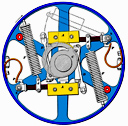
| Project Astro | |||
(skip this and go to the activities here) I've worked with 4th graders for a while now and have developed a program that matches up (well? maybe I'm being too optimistic) with the curriculum used here in Andover. Now if you happen to be one of the students that I will be working with then I'll ask you stop reading and go to some other website, as this will be the "spoiler" to the activities you will be doing. General information Most of the activities are 90 minutes long. While this can sometimes be a scheduling problem I've found that shorter visits just aren't that effective. You lose a few minutes getting started, and having an open question/answer session at the end really helps encourage kids to be involved. I'm not trained as an educator, but I have watched others in action and have definitely learned the *worst* thing you can do is to stand up and talk for an hour. The whole premise of Project Astro is to use scientific principals as an aid to develop general learning. I am there in the room to guide the class to formulate the problem, define the experiment, and evaluate the outcome. Well, OK, it's never quite that simple, and some things are actually best done lecture style. But I try and minimize the lecturing. Unfortunately looking at the slides you don't see the actual interaction from the students. And anyway, even if I detailed out what I did, my style may not work for you. So best to think of the materials as a guide and definitely *not* as a script. As such, a white board is indispensable for writing down student answers. As much as possible I try and leave them up so we can come back to them as the activity proceeds. ResourcesThe activities are all based on activities found in:
Of course Google is your friend in the resource department. Of course you can't do a Google search with the "no loony filter" so be careful...Wiki is almost always a reliable source for science materials. If you've never done Project Astro beforeI find it to be a lot of fun and it's definitely very personally rewarding to see the excitement in the students' eyes when they do the activities. The "Cook a Comet" activity is something that they still talk about years later; not many science things from the 4th grade survive that long. Definitely read all the Project Astro materials and attend the training sessions offered (While I did attend initial ones, I'm a little behind on that latter aspect; my teacher or I always seem to have a scheduling conflict). Start simple the first year, pick maybe 3 activities that you're comfortable with. It also gives you time to understand the curriculum and branch out from there. It took me a while to get a feel for the developmental stage of 4th graders. Spatial reasoning is just beginning to develop and it presents some issues with the exercises (see the moon phases activity). I would estimate that I've put about 40 hours into the creation of each activity; most of it in the first year but I go back through and make updates as needed and sometimes add/remove content. OTOH if some of the materials here are useful then maybe you won't need to spend as much time. Also keep in mind that all of the activities can be done more or less exactly as written up in the guidebooks and you can dispense with the extras that I have developed. IMHO *anything* is better than nothing when it comes to assisting in scientific literacy in our school children.
|
|||
Index of activities |
|||
4th grade outline can be found here Basic Electricity project is here (non-astronomy) |
|||
| Other info | |||
Some pictures I've taken over the years
|
|||
|
|||